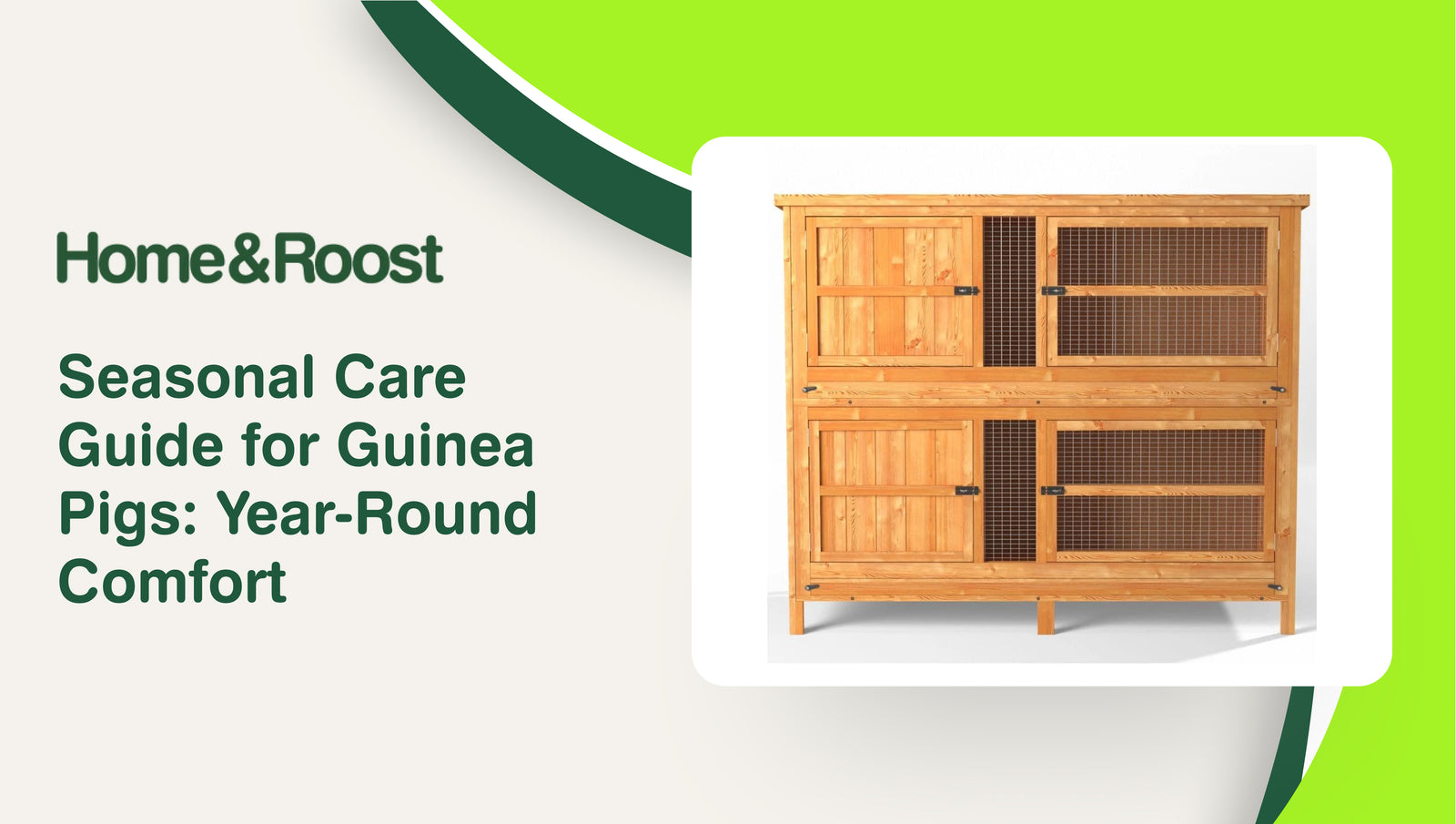Guinea pigs are adorable pets that need care throughout the year. Let's explore how to keep your furry friends happy and healthy in every season. Proper seasonal care ensures your guinea pigs thrive no matter the weather outside.
Key Takeaways: Seasonal Guinea Pig Care
Seasonal Care for Guinea Pigs
- All Seasons:
- Adjust housing for temperature changes
- Provide fresh, seasonal vegetables
- Monitor hydration levels
- Ensure proper insulation
- Conduct regular health checks
- Spring:
- Perform thorough spring cleaning of hutch
- Replace old bedding with fresh materials
- Check and repair any hutch damage
- Gradually introduce fresh spring vegetables
- Monitor for digestive issues with diet changes
- Summer:
- Provide cooling methods (frozen water bottles, cooling pads)
- Ensure constant access to fresh water
- Offer water-rich vegetables as treats
- Limit outdoor time during peak heat
- Autumn:
- Prepare hutch for colder weather
- Introduce seasonal vegetables like pumpkin and squash
- Increase indoor exercise opportunities
- Winter:
- Ensure hutch is well-insulated
- Provide extra bedding for warmth
- Monitor for signs of respiratory issues
- Adjust diet for increased calorie needs
Spring Care for Guinea Pigs
As the weather warms up, it's time to refresh your guinea pig's habitat. Start with a thorough spring cleaning of their hutch. Remove old bedding, wash all surfaces, and replace with fresh materials. This is a great time to check for any damage to the hutch that needs fixing.
Gradually introduce fresh spring vegetables to your guinea pig's diet. Start with small amounts to avoid upsetting their tummy. Leafy greens like romaine lettuce and spinach are good choices. Remember, any diet changes should be made slowly to prevent digestive issues.
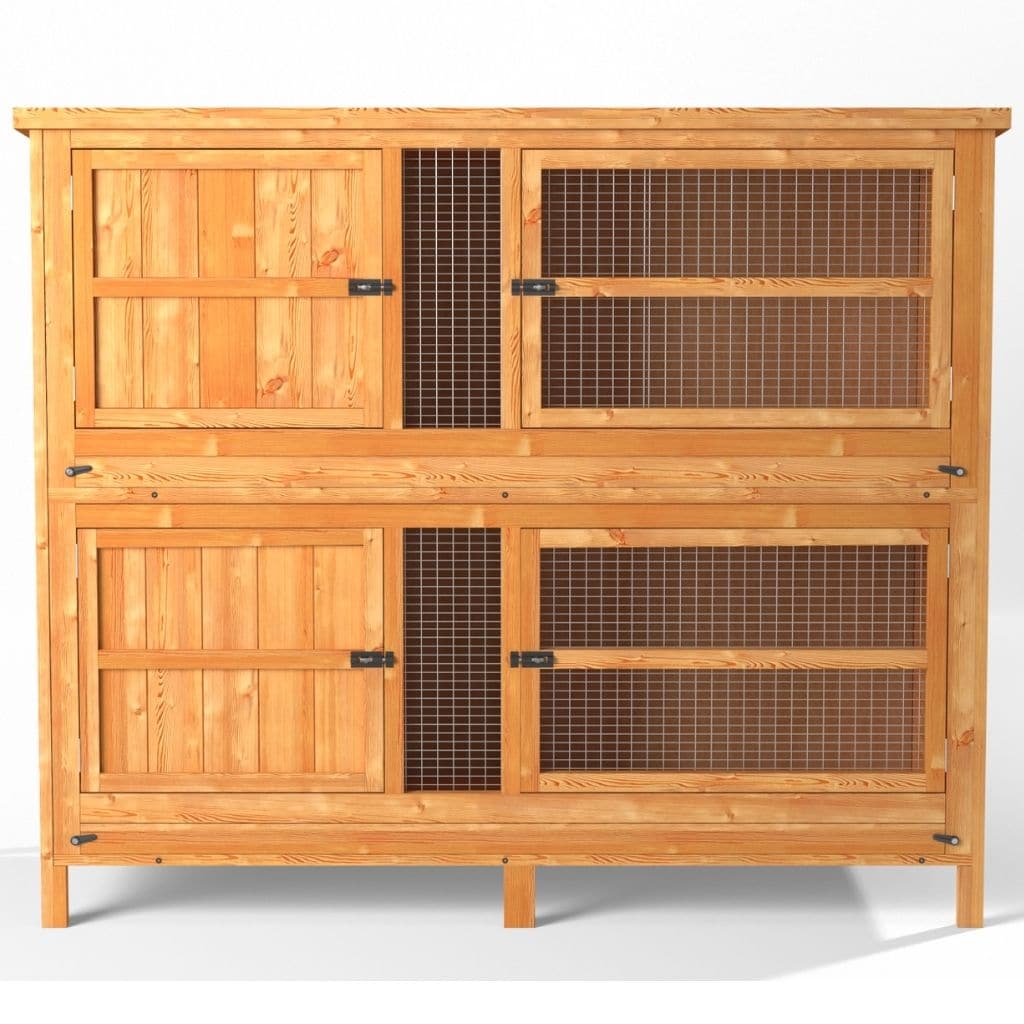
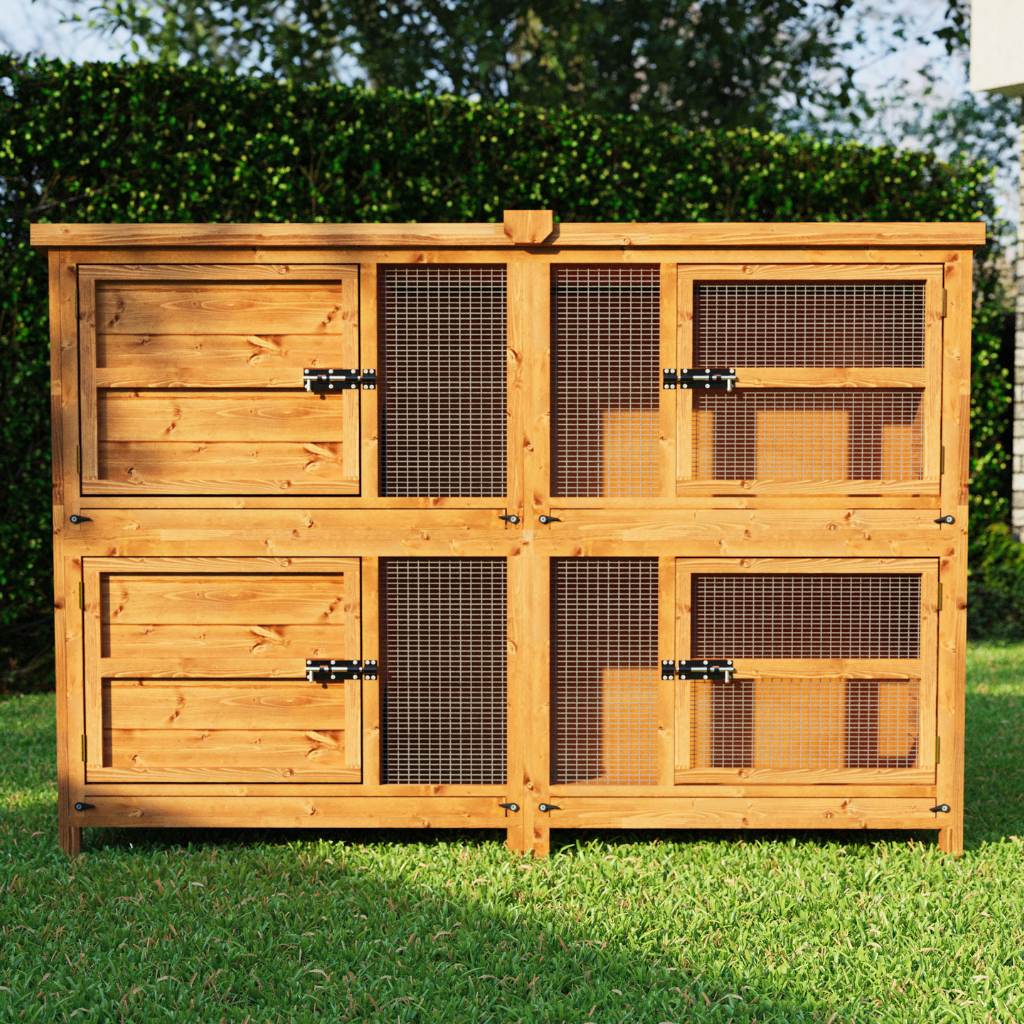
As the days get longer, your guinea pigs might enjoy more outdoor time. Make sure their outdoor run is secure and provides shade. Always supervise outdoor playtime to keep your pets safe from predators and extreme weather. Check out our collection of guinea pig accessories for outdoor play items.
Spring is also an excellent time to establish a regular grooming routine. Brush your guinea pigs regularly to remove loose fur and check for any skin issues that may have developed over the winter months. This bonding time can help strengthen your relationship with your pets.
Summer Care Tips
Summer can be tough on guinea pigs. They don't sweat and can overheat easily. Keep their hutch in a shaded area, away from direct sunlight. You can use a cooling pad or frozen water bottle wrapped in a towel to help them stay cool on hot days.
Hydration is super important in summer. Check their water bottle several times a day to ensure it's full and working properly. You can offer small pieces of water-rich vegetables like cucumber or watermelon as a treat, but don't overdo it.
If you take your guinea pigs outside, limit their time in the heat. Early morning or evening when it's cooler are the best times for outdoor play. Always provide a shaded area and fresh water in their outdoor enclosure.
During summer, be extra vigilant about parasites. Check your guinea pigs regularly for signs of fleas or mites, which can be more active in warmer weather. Keep their living area clean and dry to discourage pest infestations.
Autumn Care for Guinea Pigs
As the weather cools down, it's time to prepare for winter. Start by checking your guinea pig's hutch for drafts. Seal any cracks or holes to keep the cold air out. You might need to move the hutch to a more sheltered location.
Autumn brings new seasonal veggies for your guinea pigs. Pumpkin and squash (in small amounts) can be a tasty treat. Keep offering fresh hay and pellets as the main part of their diet. As days get shorter, make sure your pets still get enough exercise. Indoor toys and tunnels can help keep them active.
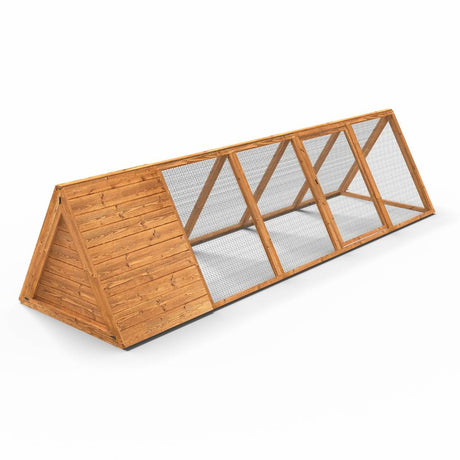
Autumn is a good time to schedule a vet check-up before winter sets in. This can help catch any potential health issues early and ensure your guinea pigs are in good condition to face the colder months. It's also a good opportunity to discuss any dietary adjustments that might be necessary for winter.
Winter Care Essentials
Winter can be tough on guinea pigs. They need extra care to stay warm and healthy. Make sure their hutch is well-insulated. You can use extra bedding and hay for them to burrow in. Some owners use a pet-safe heat pad, but be careful it doesn't get too hot.
In very cold weather, you might need to bring your guinea pigs inside. A spare room or garage can work well. If they stay outside, check on them often and make sure their water doesn't freeze. Learn more about keeping guinea pigs warm in winter.

Winter nutrition is important too. Your guinea pigs might need a bit more food to stay warm. Keep offering fresh hay and pellets, and don't forget about vitamin C. Guinea pigs can't make their own vitamin C, so they need it in their diet all year round.
During winter, pay extra attention to your guinea pigs' feet. The cold and damp can lead to problems like bumblefoot. Regularly check their feet for any signs of redness or swelling, and keep their living area as dry as possible.
Year-Round Housing Considerations
A good guinea pig hutch is key to keeping your pets comfortable all year. Look for a hutch that's big enough for your guinea pigs to move around freely. A two-tier hutch like the 4ft Chartwell Double Guinea Pig Hutch gives them plenty of space to explore.
Your hutch should have a solid, waterproof roof to keep rain out. In summer, make sure there's good ventilation. In winter, you can cover part of the hutch with a waterproof cover to keep it warmer, but always leave some ventilation to prevent dampness.
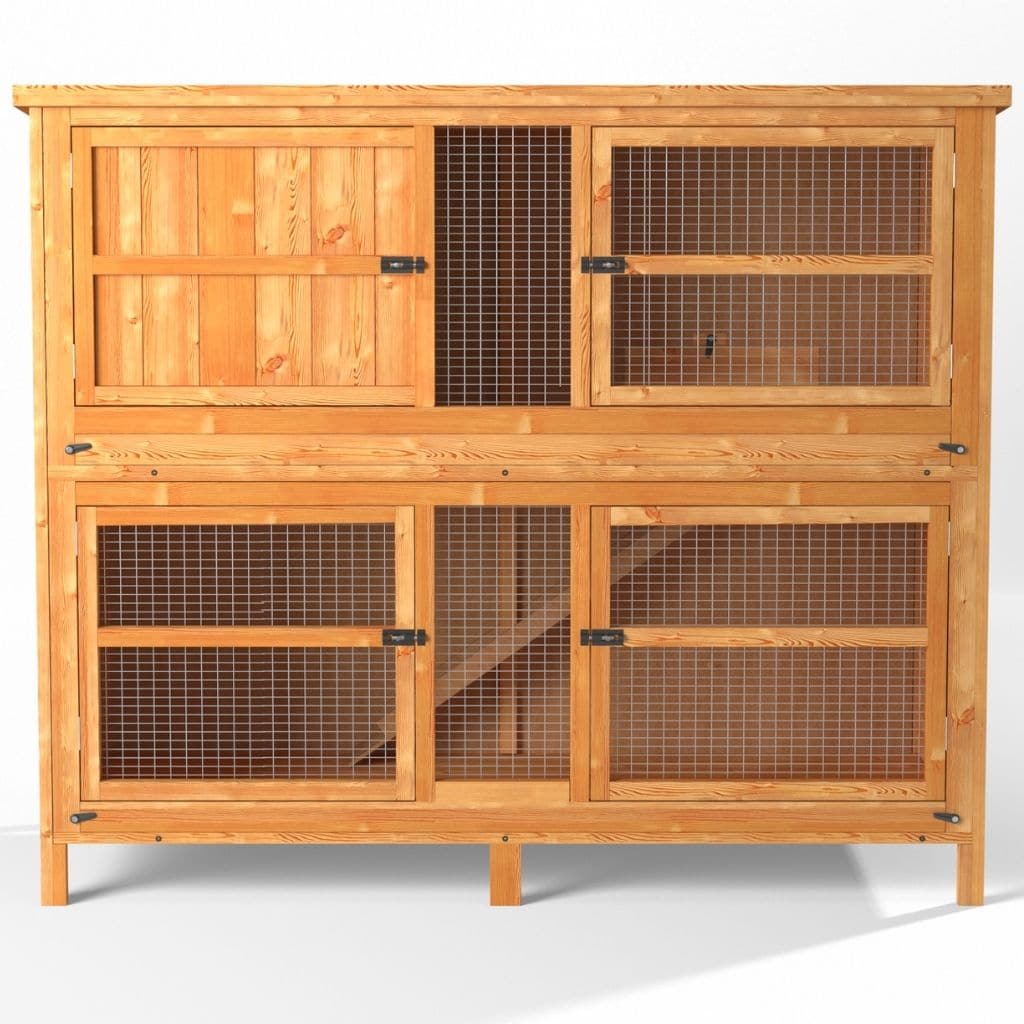
Bedding is important too. Use a thick layer of absorbent bedding like wood shavings or paper-based bedding. In winter, add extra hay for warmth. Change the bedding regularly to keep the hutch clean and dry.
Consider the placement of your guinea pig's hutch throughout the year. In summer, it should be in a shaded area to avoid direct sunlight. In winter, move it to a more sheltered location to protect from wind and rain. Always ensure the hutch is raised off the ground to prevent damp from seeping in.
Seasonal Health Concerns and Preventive Care
Each season brings different health risks for guinea pigs. In summer, watch out for heatstroke and dehydration. In winter, respiratory infections are more common. Spring and fall can bring allergies or skin issues as your pet's coat changes.
Do a weekly health check on your guinea pigs. Look at their eyes, ears, nose, and feet. Check their teeth and feel for any lumps or bumps. Weigh them regularly - sudden weight loss can be a sign of illness.
If you notice any changes in eating, drinking, or behavior, it's time to see a vet. Guinea pigs are good at hiding illness, so it's important to catch problems early. Read our winter care tips for more health advice.
Seasonal changes can affect your guinea pig's coat. In spring and fall, they may shed more as they adjust to temperature changes. Regular grooming can help manage shedding and allows you to check for any skin issues.
Seasonal Diet Adjustments
While your guinea pig's core diet should stay consistent, you can add seasonal variety with fresh veggies. In spring and summer, offer leafy greens and herbs. In fall, try small amounts of pumpkin or squash. Winter veggies like carrots and brussels sprouts can be given in moderation.
Always introduce new foods slowly to avoid upsetting your pet's digestion. Fresh hay should make up most of your guinea pig's diet year-round. Pellets provide important nutrients, and fresh water should always be available.
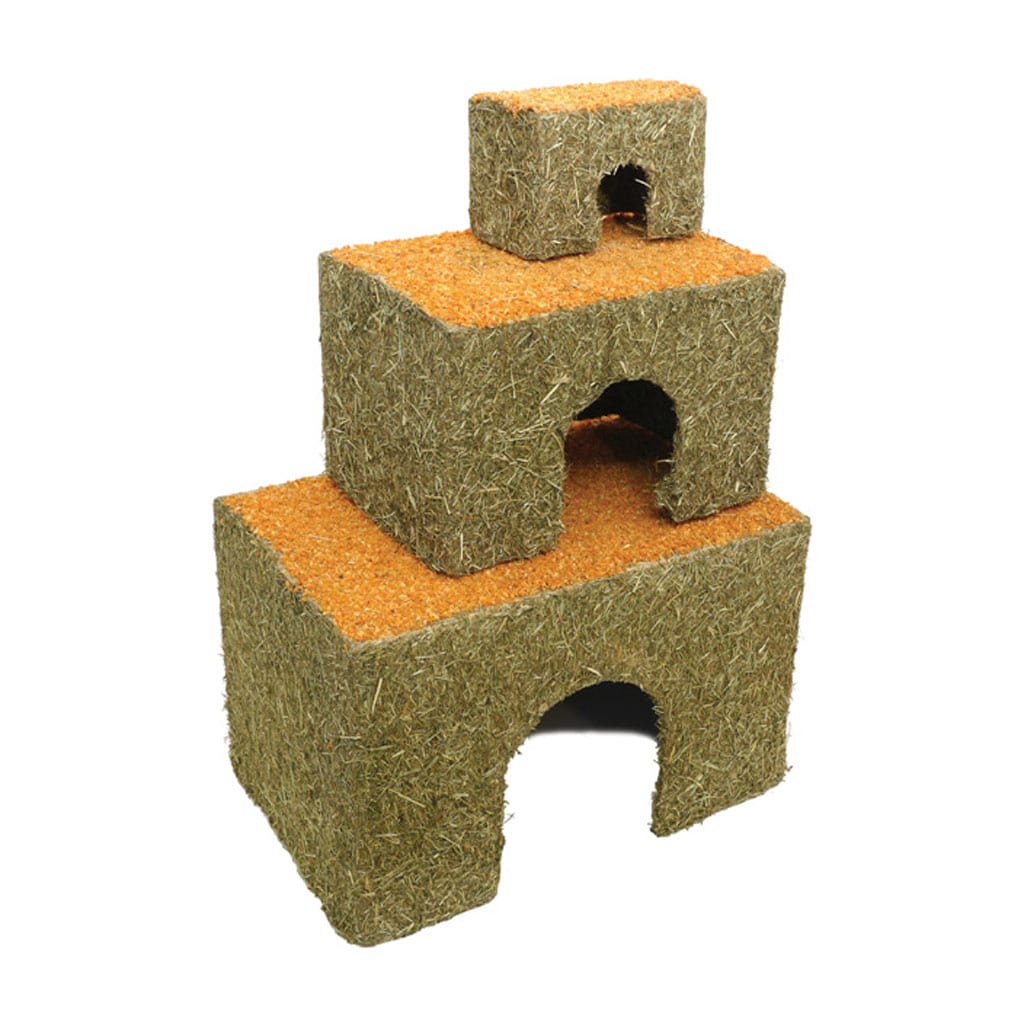
Treats like the Rosewood Naturals Carrot Cottage can be a fun addition to your guinea pig's diet. These chew toys are not only tasty but also help keep your pet's teeth healthy.
Remember that guinea pigs need vitamin C in their diet year-round, but it's especially important in winter when fresh vegetables might be less available. Consider supplementing with vitamin C drops in their water or specially formulated guinea pig treats high in vitamin C.
Conclusion: Year-Round Comfort for Your Guinea Pigs
Caring for guinea pigs throughout the year means paying attention to their changing needs. Keep their housing comfortable, adjust their diet with the seasons, and always be on the lookout for health issues. With the right care, your guinea pigs can be happy and healthy no matter the weather outside.
Remember, every guinea pig is unique. What works for one might not work for another. Pay attention to your pets and adjust their care as needed. With love and attention, you can give your guinea pigs a great life all year round.
By following these seasonal care tips and making appropriate adjustments throughout the year, you'll ensure your guinea pigs remain comfortable, healthy, and happy. Regular vet check-ups, combined with your attentive care, will help your furry friends thrive in every season.

